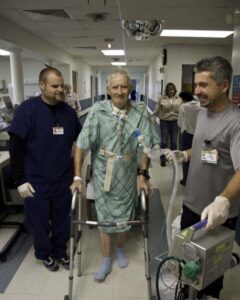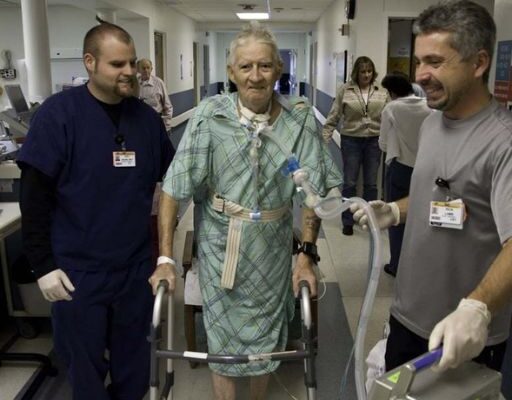They told us it would never happen.
After the accident, after the surgeries, after the infections and the slow, bitter years of trying everything—specialists, rehab centers, alternative therapies—every doctor eventually said the same thing: He won’t walk again. You need to focus on quality of life, not hope.

But my dad?
He didn’t listen.
He trained his arms to lift what his legs couldn’t. He memorized the weight of every piece of equipment in that garage-turned-gym we built in the backyard. He never once missed a session, even when his hands shook too badly to hold a fork afterward.
He believed something the rest of us didn’t dare to anymore.
And then it happened.
It was a Thursday morning. The air smelled of fresh rain, and the sun had just begun to peek through the clouds, casting a golden light over the yard. I was on the couch, scrolling through my phone as usual, when I heard it—a sound I hadn’t heard in two decades. A thud. Then another.
My heart skipped a beat, and I jumped up, rushing outside before I could even think. There, in the middle of our backyard, was my dad—on his feet. He wasn’t standing tall, wasn’t walking, but he was there, his legs bent, his body swaying with each cautious shift, his arms extended for balance.
He was trying.
“Dad?” I called out, my voice breaking before I could stop it.
His face twisted with concentration, but when he saw me, a smile spread across his features, so wide it made my chest ache. “It’s happening, kiddo. It’s really happening.”
I couldn’t believe it. I had to blink, rub my eyes, and make sure I wasn’t imagining it. For twenty years, I had watched him in a wheelchair—first, unable to move from the waist down, then, slowly, gaining some mobility in his arms but never his legs. We had all accepted that he’d never walk again. We had resigned ourselves to the idea that this was his life, and we should be thankful for whatever progress we’d seen. But now, here he was, trying to stand, trying to move.
“Are you okay?!” I asked, rushing over to steady him.
He waved me off, breathing hard but with an unmistakable sense of triumph in his eyes. “I’m good, just… need to get my balance.”
It took him a few more tries before he finally, cautiously, took a step—just one, but it was enough. My heart hammered in my chest as I watched him, stunned, unable to believe what I was seeing.
For the next few weeks, it was all he could talk about—every day, he made small but significant improvements. He would hold onto the bars in his garage gym and take a step, then another. Every evening, when we thought he was done for the day, he would push himself further, surprising everyone who thought he had already given all he had.
“Don’t count me out,” he would say with a grin, clearly enjoying the disbelief in our eyes.
But here’s the thing no one tells you about when you have a father like mine—someone who pushes against the odds every day, who fights relentlessly even when the world tells him to quit. It’s not just the physical exhaustion you see. It’s the emotional toll. He started wearing down. He began to feel frustrated by the slow pace of progress, his body not responding the way he wanted it to, the fatigue that made him more irritable and impatient.
There were days when I could see the doubt creeping in behind his stubborn eyes. And there was one day, a particularly tough one, when I walked into the gym and saw him sitting on the floor, tears in his eyes, his hands gripping his knees like he was holding on for dear life.
“Dad?” I whispered, hesitating to approach.
“I don’t know if I can do it anymore, kid,” he said quietly, looking up at me with an expression I’d never seen on his face before—vulnerable, defeated. “What if I’m just chasing a dream that’s never going to come true?”
The weight of those words hit me harder than I could have imagined. For all these years, I had watched him fight, watched him convince me and everyone else that he would walk again. He had made us believe in his dream, in the possibility of hope, even when everyone else had given up. And now, here he was, questioning it all.
I sat next to him and put a hand on his shoulder. “Dad, you’ve already done something no one thought was possible. You’ve already changed the game. Look at how far you’ve come. One step at a time. You’ve proven more than just that you can walk again—you’ve shown us all that there’s no such thing as impossible.”
He looked at me, his face softening, but the weariness in his eyes remained. “I just… don’t know if I have it in me anymore. What if I’m too old for this? What if my body won’t keep up?”
The doubt in his voice cut through me, but I had to remind him of the truth. “You’ve been defying the odds since the day it all happened. You’ve always found a way. Just because it’s hard doesn’t mean it’s not possible.”
I didn’t have all the answers. But what I did have was the belief that he could keep going, even if it meant taking smaller steps than he wanted.
And that’s when I realized something important—this wasn’t just about walking. This was about proving to himself, to all of us, that there’s always a chance for redemption, always an opportunity for growth, no matter how late in life it comes. And sometimes, the battle isn’t just with your body—it’s with your mind.
A few more months passed. The steps became longer. The struggles didn’t disappear, but they became more manageable. Dad found a rhythm, a routine that worked for him. He started walking on his own for short distances, and although the fatigue still came at night, the feeling of accomplishment was greater than the exhaustion.
But then came the real twist—the one I didn’t see coming.
The whole time my dad had been pushing himself, there was someone else watching—someone who had been quietly supporting him from behind the scenes.
It turned out that my dad’s rehab therapist, who he had worked with for years but always seemed to push away when he wasn’t at his best, had been part of a research program for a new type of spinal cord treatment. The experimental procedure had been showing some incredible results with people who had been written off by conventional doctors. It was a long shot, but there was a chance it could work for my dad.
We were cautious at first—what if it didn’t work? What if we just added another layer of disappointment? But my dad, ever the fighter, took a chance. And to our shock, the results were miraculous. Over the next several months, my dad made more progress than we could have dreamed of.
Not only did he walk, but he also ran—at least for a short time, in bursts, with help. He was training harder than I’d ever seen, and the man who had once been told he would never walk again was now preparing for a 5k race in our local town.
It wasn’t about the race. It wasn’t even about the walking, or the running, or the final moment of triumph we all imagined. What I realized as I stood there, cheering him on as he crossed the finish line, was that it wasn’t the physical act that had changed. It was his mindset—the belief that no matter how impossible it seemed, he would find a way to keep pushing forward.
And here’s the kicker: When my dad crossed that finish line, he didn’t just prove to us that he could do it. He showed us that the only limits we truly have are the ones we place on ourselves.
His determination paid off. It wasn’t just a victory for him, but for everyone who had ever doubted their own potential.
So, if you’re facing something in your life that seems impossible, remember my dad’s story. You’re stronger than you think, and you have more control over your journey than you realize. Keep pushing. Keep believing.
And if you know someone who might need a little encouragement today, share this story with them. Let’s remind each other that it’s never too late to change your life.



